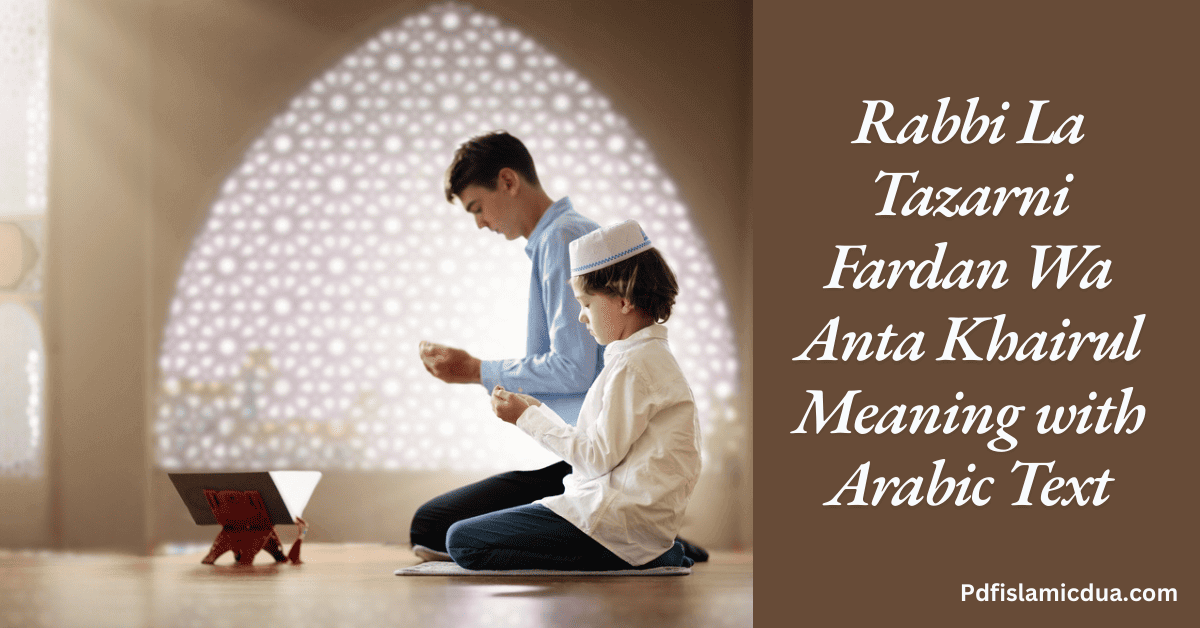Blog
Dua & Surah PDF
dua rabbi la tazarni fardan, rabbi la tazarni, rabbi la tazarni fardan, rabbi la tazarni fardan dua, rabbi la tazarni fardan wa anta, rabbi la tazarni fardan wa anta full dua, rabbi la tazarni fardan wa anta khairul waris ki fazilat, rabbi la tazarni fardan wa anta khairul wariseen, rabbi la tazarni fardan wa anta khairul wariseen dua, rabbi la tazarni fardan wa anta khairul wariseen wazifa, rabbi la tazarni fardan with urdu translation
pdfislamicdua
0 Comments
Rabbi La Tazarni Fardan Wa Anta Khairul Meaning with Arabic Text
The dua “Rabbi la tazarni fardan wa anta khairul wariseen” (رَبِّ لا تَذَرْنِي فَرْدًا وَأَنتَ خَيْرُ الْوَارِثِينَ) was made by Prophet Zakariya (peace be upon him) in his old age, as he prayed for an heir. Despite his advanced years and his wife’s barrenness, he humbly asked Allah for a child, recognizing that Allah is the Best of Inheritors, sustaining all things even after people pass away. This Dua reflects Zakariya’s deep trust in Allah’s mercy and power to fulfill his needs, no matter how impossible they may seem.
Rabbi La Tazarni Fardan Wa Anta Khairul Meaning with Arabic Text
| Dua in Arabic | Transliteration | Translation |
|---|---|---|
| رَبِّ لا تَذَرْنِي فَرْدًا وَأَنتَ خَيْرُ الْوَارِثِينَ | Rabbi la tazarnee fardan wa anta khayrul wariseen | My Lord, do not leave me alone, and You are the best of inheritors. |
Surah Al-Anbiya, verse 89
In this heartfelt dua, Prophet Zakariya (peace be upon him) asks Allah to bless him with a child, recognizing that Allah is the Best of Inheritors, who takes care of everything after people are gone.
Recent Posts
- Surah Fatiha Full Image Download PDF with Translation
- Islamic Dream Interpretation with Sunnah Guidance
- Bismillahi Arqeek min Kulli Dua Benefits, Meaning & Hadith
- Benefits and Translation of Ayatul Kursi in English PDF
- Surah 92 The Night (Surah Al-Lail) in Arabic, Translation and PDF
Explanation of Rabbi La Tazarni Fardan Wa Anta Khairul Dua
- A Humble Prayer for an Heir: Prophet Zakariya asked Allah to bless him with a child who could continue his mission. This Dua shows his humble reliance on Allah to grant him a successor.
- Recognizing Allah as the Eternal Sustainer: Zakariya calls Allah the “Best of Inheritors,” meaning that while people come and go, Allah lives forever and keeps everything going. This phrase also reflects Zakariya’s trust that Allah will watch over his legacy.
- Allah’s Miraculous Response: Despite Zakariya’s old age and his wife’s inability to conceive, Allah, in His mercy and power, granted him a son, the prophet Yahya (peace be upon him). This miracle shows Allah’s ability to do anything, no matter how impossible it seems.
- Highlighting Allah’s Everlasting Nature: Zakariya’s praise reminds us that everything eventually fades, but Allah remains forever, taking care of all creation.
- Expressing Humility and Hope: By calling Allah the “Best of Inheritors,” Zakariya humbly praises Him, showing his deep respect and hope for Allah’s mercy.
- Seeking Lasting Blessings: Zakariya’s prayer reflects his hope for reassurance, comfort, and Allah’s blessings that would continue even after his life.
Benefits of Reciting the Dua
1. Gift of Children: Zakariya’s dua was answered with the blessing of a child, showing us that Allah can give us what we deeply long for, even when we think it’s impossible.
2. Trust in Allah’s Power: This dua reminds us that Allah’s power is limitless, and He can answer our prayers no matter how difficult our situation seems.
3. Humility Before Allah: Zakariya’s words, “And You are the best of inheritors,” remind us to stay humble and always recognize that Allah is eternal, even when everything else fades.
4. Guidance for Believers: This dua teaches us to ask Allah for His mercy and blessings with a heart full of humility and hope.
5. Allah’s Eternal Care: By acknowledging that Allah is the one who remains when others pass, the dua gives us peace, knowing He will always be there for us.
6. Emotional Reassurance: Zakariya’s plea shows that it’s okay to seek comfort and security in Allah and that He is the One who brings us that peace.
7. Acknowledging Allah’s Greatness: By praising Allah as the “best of inheritors,” we remind ourselves of His unmatched greatness and mercy.
8. Hope in Allah’s Mercy: This dua fills our hearts with hope, showing us that no matter how impossible our dreams may seem, Allah can still make them come true.














Post Comment